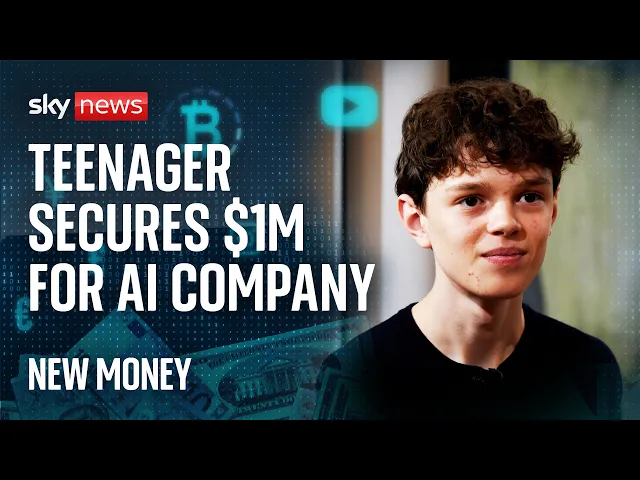Meet the teenage AI company founder who secured a $1m investment

Teenage founder lands $1m for AI startup
In a world where prodigious tech talent emerges from unexpected places, 16-year-old Toby Brown stands out as a remarkable example of youth entrepreneurship in the AI space. From his family home in London, this teenage coding wunderkind has developed an AI platform called Beam that recently secured a $1 million investment from Silicon Valley backers, causing him to postpone his GCSEs while still balancing his studies.
Key insights from Toby's journey:
- Started coding at just seven years old, building math games to help himself learn multiplication tables, showcasing how early technical curiosity can snowball into sophisticated skills
- Created his own version of ChatGPT through self-teaching and "a bit of Googling" before realizing that AI interfaces needed reimagining, which sparked the vision for Beam
- Successfully pitched to Silicon Valley investors by focusing on his product's value rather than his age, emphasizing that "what we're building is incredible… and it just happens the person who's come up with this idea is 16"
The democratization of tech entrepreneurship
What strikes me most about Toby's story is how it illuminates the democratization of tech entrepreneurship. Twenty years ago, launching an AI company would have required institutional backing, advanced degrees, and access to computing resources only available to established organizations. Today, a teenager with determination and self-taught skills can build sophisticated AI applications from their bedroom.
This transformation reflects a profound shift in the technology landscape. The proliferation of free learning resources, open-source tools, and cloud computing has dismantled traditional barriers to entry. Young innovators like Toby don't need permission from gatekeepers—they need only curiosity, persistence, and an internet connection.
Beyond the prodigy narrative
While Toby's story is inspiring, it's important to look beyond the "teen prodigy" framing that often dominates such narratives. His success isn't simply about natural talent or being in the right place at the right time.
What's often overlooked in these stories is the structural support that enables such achievements. Toby clearly had access to technology from a young age, supportive parents willing to let him delay formal education, and the socioeconomic stability to pursue unpaid work
Recent Videos
How To Earn MONEY With Images (No Bullsh*t)
Smart earnings from your image collection In today's digital economy, passive income streams have become increasingly accessible to creators with various skill sets. A recent YouTube video cuts through the hype to explore legitimate ways photographers, designers, and even casual smartphone users can monetize their image collections. The strategies outlined don't rely on unrealistic promises or complicated schemes—instead, they focus on established marketplaces with proven revenue potential for image creators. Key Points Stock photography platforms like Shutterstock, Adobe Stock, and Getty Images remain viable income sources when you understand their specific requirements and optimize your submissions accordingly. Specialized marketplaces focusing...
Oct 3, 2025New SHAPE SHIFTING AI Robot Is Freaking People Out
Liquid robots will change everything In the quiet labs of Carnegie Mellon University, scientists have created something that feels plucked from science fiction—a magnetic slime robot that can transform between liquid and solid states, slipping through tight spaces before reassembling on the other side. This technology, showcased in a recent YouTube video, represents a significant leap beyond traditional robotics into a realm where machines mimic not just animal movements, but their fundamental physical properties. While the internet might be buzzing with dystopian concerns about "shape-shifting terminators," the reality offers far more promising applications that could revolutionize medicine, rescue operations, and...
Oct 3, 2025How To Do Homeless AI Tiktok Trend (Tiktok Homeless AI Tutorial)
AI homeless trend raises ethical concerns In an era where social media trends evolve faster than we can comprehend them, TikTok's "homeless AI" trend has sparked both creative engagement and serious ethical questions. The trend, which involves using AI to transform ordinary photos into images depicting homelessness, has rapidly gained traction across the platform, with creators eagerly jumping on board to showcase their digital transformations. While the technical process is relatively straightforward, the implications of digitally "becoming homeless" for entertainment deserve careful consideration. The video tutorial provides a step-by-step guide on creating these AI-generated images, explaining how users can transform...
